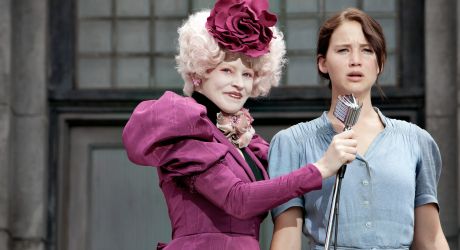The first chapter in the highly anticipated franchise gets off to a solid start, and may the odds be forever in their favour.
Director: Gary Ross
Writer(s): Gary Ross, Billy Ray, Suzanne Collins
Runtime: 142 minutes
Starring: Jennifer Lawrence, Josh Hutcherson, Liam Hemsworth, Woody Harrelson, Elizabeth Banks, Lenny Kravitz, Wes Bentley, Stanley Tucci
Distributor: Roadshow Films
Country: US
Rating: Better Than Average Bear (?)
The Hunger Games arrives with all of the hype of a major franchise release, yet for the majority of mainstream audiences this may be their first encounter with the material. Based on the young adult novels by Suzanne Collins, the almost three million copies in print indicate the impact that this series has had on a generation of young readers, giving director Gary Ross‘ adaptation a pre-publicity machine of Twilight proportions. Yet with this series, Collins has tapped into a darker and more cynical stream of youth consciousness, one that has is not only filled with real characters but echoes the consequences of the way we run the world today.
In what was once North America, the nation of Panem forces the selection of one teenage girl and boy from each of its twelve districts to compete in the annual Hunger Games. The games are a combination of tribute to a age-old conflict, a form of entertainment and a government intimidation tactic from the Capitol. The “Tributes” must fight each other to the death, and only one may remain standing at the end. Voluntarily taking her sister’s place, backwater survivor and gifted hunter Katniss (Jennifer Lawrence) joins district stablemate Peeta (Josh Hutcherson) against a group of highly-trained Tributes who have been preparing for the games their entire lives.
Targeted at the same audience who devours the Twilight Saga, The Hunger Games offers a much stronger role model in the shape of Katniss. Rather than weeping for months over the loss of a fanged lover, Katniss is a self-reliant individual who relies on her own skills to get by. Jennifer Lawrence is perfectly cast, lending the film her Winter’s Bone determination and fragile beauty. This is set-up early in the film in the gap between the “haves” of the Capitol and the “have nots” of the outer districts, returning to an exploration on the class divide that we’ve not seen in teen movies since the heyday of the 1980s. Which is why it is a shame that we don’t always get to hear her inner monologue, replacing moments of contemplation with long shots of Lawrence in trees.
Gary Ross, who hasn’t directed a film since 2003’s horsey drama Seabiscuit, does a capable job of setting up the world of Panem with co-writers Billy Ray and original author Collins. In only a handful of scenes, we are presented with the rich and complex tapestry of Collins’ alternate future. It is filled with extravagant dandy couture from Rodarte, Alexander McQueen and Jean Paul Gaultier on one end of the scale, and abject poverty on the other, with people living out of the ruins of a conflict that is only hinted at. Did we not have to spend the majority of the film in the “games” themselves, this is the more intriguing of the dichotomies in the film. Characters such as the drunken mentor Haymitch Abernathy (Woody Harrelson), fashion-conscious Effie Trinket (Elizabeth Banks) and thoughtful Cinna (Lenny Kravitz) are worth exploring further. Likewise, any second we spend with emcee Caesar Flickerman (Stanley Tucci) is worth its weight in blue hair dye. The effects shots of the Capitol are breathtaking.
Shot with the close-quarter handheld camera to convey intimacy, it is one of several tactics that actually serve to momentarily distance the audience from the action. The other, being a teen-centric film, is of course the fledgling romance between Katniss and Peeta. One never gets the sense of any genuine emotion here, although readers of the original texts will get more of a sense of how everybody is ultimately using each other to get what they want. There is a sense of urgency to the survival, on the other hand, and even in the extended running time, the film rips along at a pace that other teen films would do well to take notice of.
Sharing a heritage with Japan’s Battle Royale, and harking back to 1979’s The Long Walk, Schwarzenegger’s Running Man (1987) or even death-match game show Series 7 (2001), The Hunger Games chooses not to linger too long on the social implications of reality television and ritual. There is, after all, an inherent criticism of the church/state partnership in aspects of the film’s narrative. Like the games depicted, this is primarily an entertainment device for the masses and it accomplishes that effortlessly.

The Hunger Games is released in Australia on 22 March 2012 from Roadshow Films.







Cudos to you for reading the books! Great review. I got the impression that a lot was done to prevent the audience noticing Jennifer is substantially taller than Josh. The hand-held up-close action was almost making me ill by the end of it. On the upside, the costume designers deserve a few oscars!!!